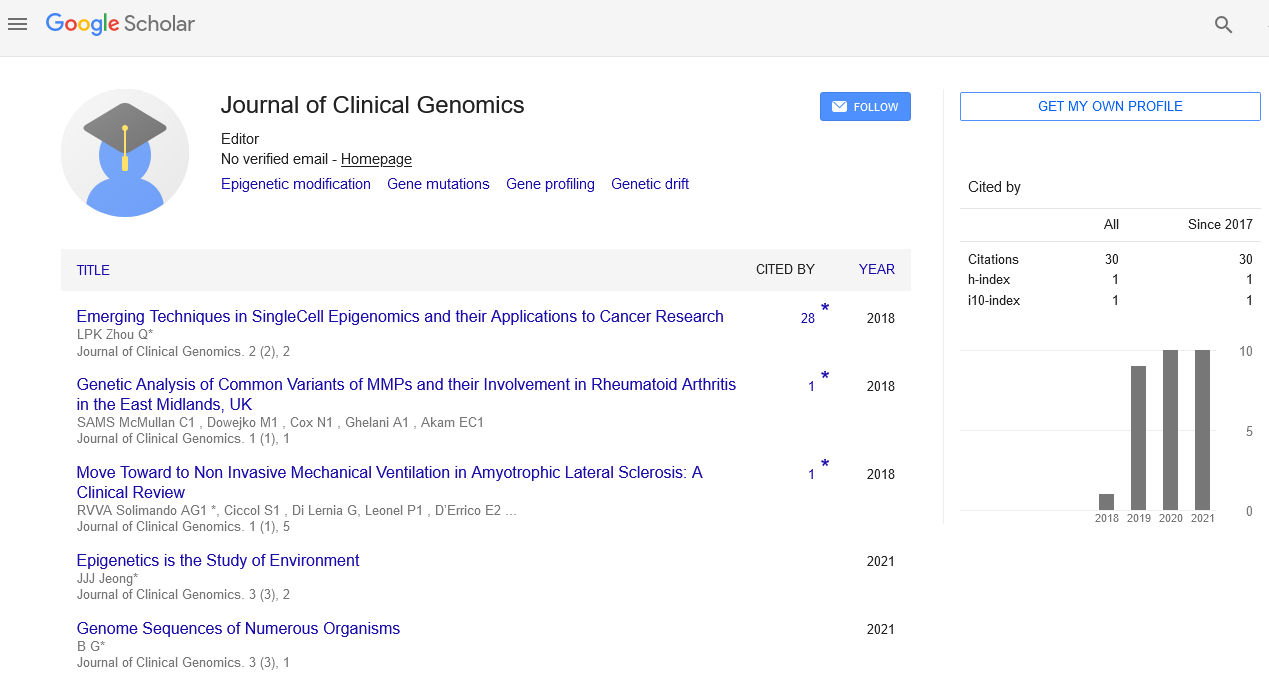Opinion Article, J Clin Genom Vol: 5 Issue: 4
Exploring the Types and Impact of Gene Mutations on Human Health
Yan Wincheng*
1Department of Hematology, Shandong University, Jinan, China
*Corresponding Author: Yan Wincheng,
Department of Hematology, Shandong
University, Jinan, China
E-mail: yan_wincheng@su11.cn
Received date: 22 November, 2023, Manuscript No. JCG-24-125695;
Editor assigned date: 24 November, 2023, PreQC No. JCG-24-125695 (PQ);
Reviewed date: 11 December, 2023, QC No. JCG-24-125695;
Revised date: 19 December, 2023, Manuscript No. JCG-24-125695 (R);
Published date: 26 December, 2023, DOI: 10.4172/JCG.1000143
Citation: Wincheng Y (2023) Exploring the types and Impact of Gene Mutations on Human Health. J Clin Genom 5:4.
Description
Genes encode the instructions for the development, functioning, and regulation of the bodies. However, sometimes these instructions are subject to alterations known as gene mutations. It delves into the diverse types of gene mutations and their profound impact on human health. Point mutations involve changes in a single nucleotide within the DNA sequence. These alterations can be classified into three categories such as substitution, insertion, and deletion. Substitutions replace one nucleotide with another, potentially leading to altered protein synthesis. Insertions and deletions, on the other hand, can cause a shift in the reading frame, resulting in a different amino acid sequence. Frameshift mutations occur when the addition or deletion of nucleotides disrupts the reading frame of the genetic code.
This can have cascading effects on the synthesis of proteins, often leading to nonfunctional or truncated proteins. Diseases like cystic fibrosis and certain types of cancer can be attributed to frameshift mutations. Missense mutations involve the replacement of one nucleotide, leading to the incorporation of a different amino acid in the protein sequence. Depending on the nature of the amino acid change, missense mutations can either be benign or have significant functional consequences. Diseases such as sickle cell anemia and Huntington's disease are linked to missense mutations. Nonsense mutations introduce a premature stop codon in the genetic code, resulting in the termination of protein synthesis before the full-length protein is produced. This truncated protein often lacks essential functional domains, contributing to various genetic disorders.
Many hereditary diseases are directly linked to gene mutations. For instance, mutations in the BRCA1 and BRCA2 genes are associated with an increased risk of breast and ovarian cancers. Understanding these mutations can pave the way for early detection and personalized treatment strategies. Accumulation of specific mutations in oncogenes or tumor suppressor genes can trigger uncontrolled cell growth and lead to cancer. Unraveling the genetic basis of cancer allows analysts to develop targeted therapies aimed at disrupting the molecular pathways responsible for tumor development.
Gene mutations can influence an individual's response to certain medications. Pharmacogenomics, a field that explores the impact of genetic variation on drug response, helps tailor treatments based on a patient's genetic makeup. This personalized approach enhances treatment efficacy while minimizing side effects. While some mutations are detrimental, others contribute to the diversity of the human gene pool and may confer evolutionary advantages. Understanding the balance between beneficial and harmful mutations is essential for comprehending the adaptive processes that have shaped the human species over time.
Knowledge of gene mutations is integral to the development of precision medicine. Developing treatments to an individual's genetic profile allows for more effective and targeted interventions, minimizing side effects and optimizing therapeutic outcomes. Understanding the genetic basis of diseases enables early detection and intervention. Genetic screening can identify individuals at higher risk for certain conditions, allowing for proactive measures and preventive strategies. Studies into gene mutations drives advancements in therapeutic strategies. Emerging technologies, such as gene editing techniques like CRISPR-Cas9, has the potential of correcting harmful mutations and treating genetic disorders at their root.
Conclusion
Gene mutations are a double-edged sword, playing a pivotal role in both health and disease. By exploring the various types of mutations and their impact on human health, analysts and healthcare professionals can better comprehend the underlying causes of genetic disorders, paving the way for innovative diagnostic tools and targeted therapies. As the understanding of genetics continues to deepen, the potential to unlock the mysteries of gene mutations provides hope for a future where precision medicine transforms the landscape of healthcare.
 Spanish
Spanish  Chinese
Chinese  Russian
Russian  German
German  French
French  Japanese
Japanese  Portuguese
Portuguese  Hindi
Hindi 